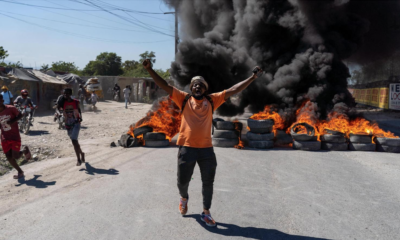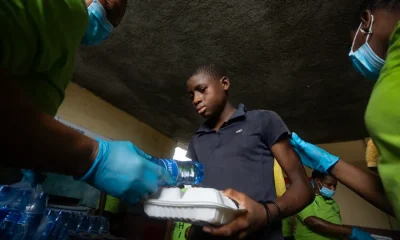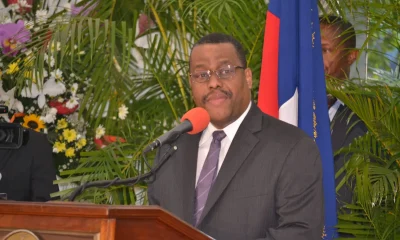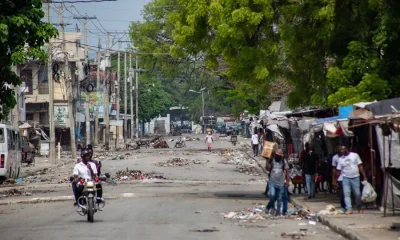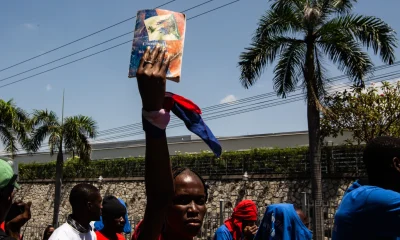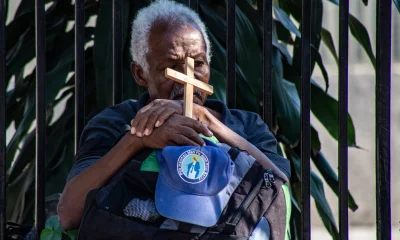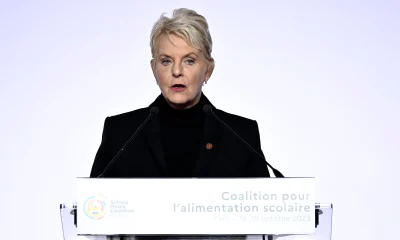International
Haiti’s most powerful gang leader proposes to lay down his arms in pursuit of a national dialogue
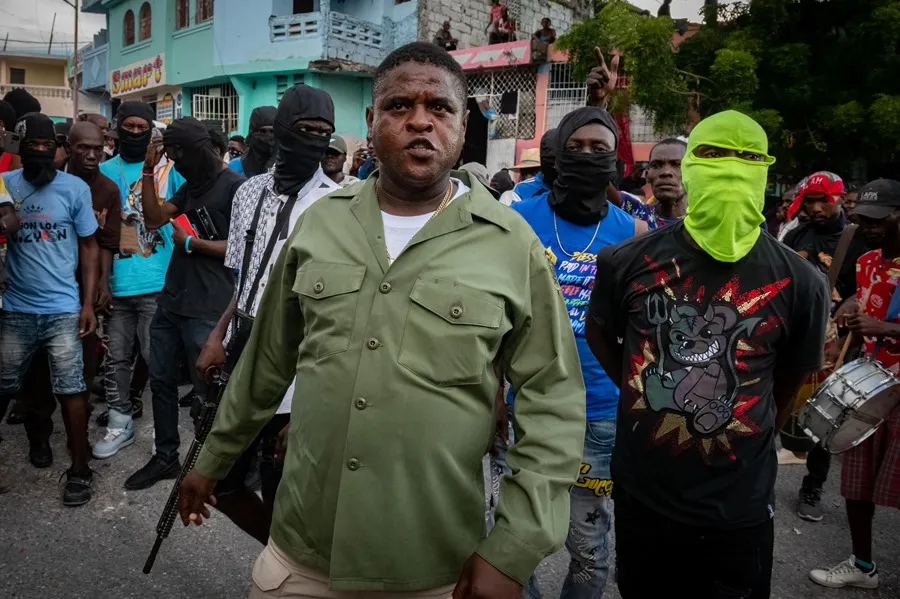
Former police officer Jimmy Cherisier, alias ‘Barbecue’, the most powerful armed gang leader in Haiti, proposed this Friday to Prime Minister, Garry Conille, to lay down his arms in an attempt to engage in a national dialogue with a view to recovering peace.
“We have decided to publicly announce that our strategy of laying down arms to facilitate national dialogue and promote peace is already written in black and white on our agenda,” Cherisier, who leads the coalition of armed gangs Vivre Ensemble (Living Together), told the media.
With a red garnet jacket and glasses, it was another Barbacue who appeared before the press today, with a written speech.
A man who usually allows himself to be seen armed and prepared for combat, this time showed a different tone and gestures, repeating again and again his call to national dialogue.
“We are willing to choose a credible and coherent Haitian citizen in the diaspora to facilitate dialogue in order to end this mafia war and facilitate the path to peace in the country,” Barbecue insisted.
Too many divisions, discord and conflicts between local actors have led the international community to look for Garry Conille and put him as prime minister, he recalled, denouncing the “political and economic mafia that keeps the country kidnapped.”
“We want peace because we want to destroy the war. We want dialogue because we want peace. All those who do not want dialogue sat in the war,” said the leader of the most powerful gangs in the country.
According to Barbecue, the weapons used by his men have been put in their hands by “personalities,” who have also sold them weapons.
The former policeman admitted to having made “several mistakes” in his activities as a gang leader.
“Why won’t this man, Dr. Garry Conille, take advantage of the national dialogue to end the war and bring peace back to the whole country?” he wondered.
According to Cherisier, the prime minister must clearly understand that national dialogue is the only way to ensure that the country does not follow the same course that it has tridled so far.
“Only through national dialogue will the Haitian State be able to regain control of the country’s territories, as required by the current Constitution,” said Barbecue, who did not cease to praise Conille’s merits.
He also affirmed that armed gangs should be considered rebel forces, not gangs.
“Let’s focus on the real solution, which is the national dialogue, where every Haitian, without discrimination, has the right to speak. And that’s what the mafias don’t want. They don’t want dialogue because they want to continue with the war,” he said, without identifying those “mafias.”
Barbacue, a powerful gang leader, has received accusations of committing several massacres, murders and homicides in the country. His name Barbecue comes from the fact that he burned his adversaries in an oven once they were captured.
The last crime committed by the leader of the gang – which he himself has claimed – was the murder of three police officers from the Elite Anti-Pang Unit (UTAG, in French) of the National Police in his bastion of Delmas 18, Sans Fil, on Sunday, June 9.
The ex-police is at the head of the two most powerful coalitions of armed gangs in Haiti, the G9 and the GPEP.
Last February, the armed coalition Vivre Ensemble created a situation of terror in Haiti, facing the police, destroying and burning police stations and expelling thousands of residents from their homes. The center of Port-au-Prince is totally destroyed due to the terror of the armed gangs, which dominate much of the capital.
A first contingent of police officers from Kenya have been in Port-au-Prince for more than a week, as part of an advance of 1,000 agents from that country who, together with members of security forces from other nations, will form a multinational mission to help the Haitian authorities regain control of the country.
International
Claudia Sheinbaum: Operation Against ‘El Mencho’ Was Based on Pending Arrest Warrants

Mexico’s President Claudia Sheinbaum on Wednesday rejected claims that the military operation that resulted in the death of Nemesio Oseguera Cervantes, known as “El Mencho,” leader of the Jalisco New Generation Cartel (CJNG), was carried out under pressure from the United States government.
Sheinbaum explained that the deployment of federal forces was aimed at executing outstanding arrest warrants against Oseguera Cervantes, who was considered one of the most wanted criminals in both Mexico and the United States.
“That was not the objective (to ease pressure from the United States). It is very important, and I want to repeat it. This individual had an arrest warrant, or several,” Sheinbaum said, referring to the operation conducted on February 22.
According to the president, the initial goal was to capture Oseguera Cervantes, but military forces responded after coming under attack during the intervention.
“The operation was to detain him. The problem is that they were attacked — the Secretariat of National Defense — and they responded at that moment,” she said.
The president insisted that the action was not carried out in response to external demands, although she acknowledged intelligence cooperation with the United States.
“It was not done in any way because of pressure from the United States, not at all. Of course, there was intelligence information from the United States that was used specifically,” she concluded.
International
Spain Denies Any Agreement to Cooperate with U.S. Military in Iran Operations
International
White House Says Spain Agrees to Cooperate with U.S. Military After Trump Threatens Trade Embargo

White House Press Secretary Karoline Leavitt said Wednesday that Spain has agreed “in recent hours” to cooperate with the U.S. military, following President Donald Trump’s threat to impose a trade embargo on Madrid.
Trump had warned of potential commercial measures after Spain reportedly refused to allow the Pentagon to use facilities at Spanish military bases for operations related to Iran.
“With respect to Spain, I think you heard the president’s message yesterday loud and clear, and I understand that in recent hours they have agreed to cooperate with the United States military,” Leavitt said during a press briefing.
She added that the U.S. military is currently coordinating with its counterparts in Spain. However, the president expects broader support.
“The president expects that all of Europe, all of our European allies, of course, will cooperate in this important mission — not only for the United States, but also for Europe,” Leavitt said.
Her remarks came in response to questions about Spain’s position and its role as a U.S. ally amid rising tensions surrounding operations involving Iran.
-

 International4 days ago
International4 days agoIran Reports 201 Dead, 747 Injured After U.S. and Israeli Strikes
-

 International3 days ago
International3 days agoBrazil’s Supreme Court Rejects Bolsonaro’s Bid for House Arrest
-

 International4 days ago
International4 days agoPope Leo XIV Urges End to ‘Spiral of Violence’ in Middle East
-

 International3 days ago
International3 days agoAnti-ICE Billboard Campaign Targets Immigration Spending in 31 U.S. Cities
-

 Sin categoría5 days ago
Sin categoría5 days agoTrump: ‘We Think It’s True’ Amid Claims Iran’s Supreme Leader Was Killed
-

 International5 days ago
International5 days agoSecurity Council to Hold Emergency Meeting on Middle East Crisis
-

 International2 days ago
International2 days agoSpain’s Prime Minister to Address Nation Amid Trump’s Trade Threats
-

 International3 days ago
International3 days agoTrump Warns of ‘Major Wave’ of Attacks as Iran Conflict Escalates
-

 International3 days ago
International3 days agoMexico Calls for Immediate Probe After National Dies in ICE Custody
-

 International17 hours ago
International17 hours agoWhite House Says Spain Agrees to Cooperate with U.S. Military After Trump Threatens Trade Embargo
-

 International17 hours ago
International17 hours agoSpain Denies Any Agreement to Cooperate with U.S. Military in Iran Operations
-

 International3 days ago
International3 days agoBolivia Orders Three Investigations Into Deadly Military Plane Crash
-

 Central America17 hours ago
Central America17 hours agoNicaragua Held Responsible for Harassment of Opposition Prosecutor and His Family
-

 International2 days ago
International2 days agoNew York Announces First 2,000 Seats in Universal 2-K Program
-

 Central America3 days ago
Central America3 days agoPanama Canal Monitoring Trade as Middle East Conflict Disrupts Shipping
-

 International2 days ago
International2 days agoWarner Bros. Developing First ‘Game of Thrones’ Movie With ‘Andor’ Writer
-

 Central America2 days ago
Central America2 days agoGuatemala’s Attorney General Fails in Bid for Top Court Seat Amid Corruption Allegations
-

 International17 hours ago
International17 hours agoClaudia Sheinbaum: Operation Against ‘El Mencho’ Was Based on Pending Arrest Warrants



























